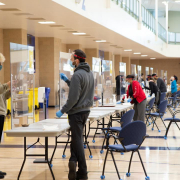Get Involved! Sustainable Food Systems Event Oct. 4
UC Davis Grand Challenges will host its inaugural campus convening on creating Sustainable Food Systems Oct. 4. Sustainable Food Systems is one of the first four Grand Challenges topic areas, and we want to connect with all faculty who are interested in contributing to real change in food systems.
This first campus convening for Sustainable Food Systems will take place 11 a.m. to 1 p.m. Tuesday, Oct. 4. The event will be held virtually or at a to-be-determined on-campus location, and will be split into two hours. All are invited to attend either or both parts:
11-11:50 a.m. — Sustainable Food Systems Grand Challenge
- Connecting with the campus community who are working in all parts of food systems
- Providing input on what makes UC Davis special and how we can most positively impact food systems
- Strategizing on next areas of engagements and strategic activities that can be pursued collaboratively across campus
- Learning about Grand Challenges and additional opportunities to get involved
12-12:50 p.m. — National Science Foundation Regional Innovation Engines
- The first activity arising from the Sustainable Food Systems Grand Challenge was the successful drafting and selection of a concept outline to compete for the NSF Regional Innovation Engine
- We are now ready to move that concept forward and develop it into a full proposal to NSF for regional economic development and food innovation commercialization through Aggie Square.
Grand Challenges is working to bring together individuals from all colleges and schools across the many disciplines represented at UC Davis to holistically tackle immense societal and environmental challenges in an inclusive, coordinated, and strategic way.
Please click here to register for the meeting by Wednesday, Sept. 28.
If interested in participating in the NSF Innovation Engines proposal, even if you cannot attend the meeting, please fill out the following preparation form by 12 p.m. Oct. 3.
NSF Regional Innovation Engines Prep Form
If you cannot attend the meeting but would still like to be involved and informed, please email: [email protected].






